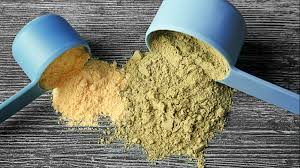
Table of Contents
When it comes to supplementing your diet with plant-based nutrition, vegan protein powder offers a convenient and effective way to meet your protein needs. Whether you’re a dedicated vegan or simply looking to reduce animal products in your diet, selecting the right vegan protein powder can be overwhelming with the wide range of options available. Here’s a comprehensive guide to help you choose the best one for your lifestyle and goals.
Understand Your Protein Needs
Before diving into the options, assess your daily protein requirements. Factors like your age, weight, activity level, and fitness goals play a significant role. Athletes or those engaging in intense workouts may need higher protein intake, making a high-quality vegan protein powder essential.
Look at the Protein Sources
The best vegan protein powders are made from diverse plant sources to ensure a complete amino acid profile. Popular protein sources include:
- Pea Protein: Rich in branched-chain amino acids (BCAAs), ideal for muscle recovery.
- Brown Rice Protein: A good option for those seeking hypoallergenic choices.
- Hemp Protein: Packed with omega-3 fatty acids and fiber.
- Soy Protein: A complete protein, but consider it only if you’re not sensitive to soy.
- Blends: Often the best choice as they combine different sources for a balanced amino acid profile.
Check for Additives and Sweeteners
Read the ingredient list carefully. Avoid powders with artificial sweeteners, colors, or fillers. Natural sweeteners like stevia or monk fruit are preferable. Choose powders with minimal processing to ensure you’re getting the cleanest product possible.
Consider the Flavor and Mixability
Taste and texture matter, especially if you’ll be consuming the powder daily. Some powders blend smoothly into water, plant-based milk, or smoothies, while others may clump. Opt for brands that provide sample sizes so you can try flavors before committing to a large tub.
Evaluate Nutritional Content
Check the label for:
- Protein per serving: Aim for at least 20 grams per scoop for muscle-building or weight loss.
- Carbohydrates and fats: If you’re watching your calorie intake, choose low-carb and low-fat options.
- Added nutrients: Some vegan protein powders include vitamins, minerals, or probiotics for added health benefits.
Choose Organic and Non-GMO Options
Organic and non-GMO certifications ensure you’re avoiding harmful pesticides and genetically modified ingredients. This is particularly important for soy-based powders.
Verify Allergen-Free Claims
If you have food allergies, double-check that the product is free from allergens like soy, gluten, or nuts. Many brands cater to specific dietary needs, so you’ll find plenty of allergen-friendly options.
Consider Sustainability
For eco-conscious consumers, look for brands that prioritize sustainability. Certifications like Fair Trade, biodegradable packaging, or carbon-neutral production can help you support environmentally friendly products.
Read Reviews and Do Research
Customer reviews provide real-world insights into taste, effectiveness, and potential side effects. Look for reputable brands with transparent manufacturing processes and clear labeling.
Budget Wisely
While high-quality vegan protein powders may be more expensive, they often deliver better results and cleaner ingredients. Compare price per serving to ensure you’re getting value for your money.
Conclusion
Choosing the best vegan protein powder depends on your individual needs and preferences. Prioritize products that are clean, nutrient-dense, and compatible with your dietary restrictions. With the right choice, vegan protein powder can become a powerful addition to your health and fitness routine.
